Sheen Magazine had the pleasure of speaking with Shayla Lawson in this exclusive interview speaking on her life and travels. If you’re interested in learning about traveling then this is the interview for you. Make sure you leave your thoughts in the comments.
When did you know you wanted to be a writer?
Insert your favorite library book where a Southern girl writes letters to her sister in Africa and falls in love with her husband’s mistress, a big-boned teenage mother learns to write poems in her after-school program, or a group of depressed colored New Yorkers learn their rainbow was enuf. I knew I wanted to be a writer because books took me on journeys imperfect and beautiful – Alice Walker, Sapphire, Ntozake Shange. Josephine Baker, Michelle Obama, Tina Turner… I’ve wanted to be an author as long as I’ve known I was a Black girl because Black women writers were my first rock stars and time travelers.
Why did you choose to work with Phoebe Robinson?
I would be best next-door neighbors with Phoebe Robinson if I could. A pair of matching pink brownstones where we would throw tea parties in the backyard and tell fabulous jokes. She’s that real. And work that she’s doing to diversify media through Tiny Reparations is essential. I pray for the day when her empire takes over the world, making it a more fashionable, compassionate place.
Your memoir is titled ” How to live free in a dangerous world” Why do you feel captive and what makes the world so dangerous to you?
This book is a “How To” because every day I wake up and choose to live in this world Blackened free, helpful tips for everyone included. But what are the dangers? Medical bills. Discrimination. Pandemics. Dictators, Stress acne. App dating, Night Terrors. Workplace aggression. Grocery store harassment. Seasonal depression. Social anxiety. Late-night food cravings. Unreliable news outlets. Climate change. Instagram algorithms…please. The list is endless.
How many countries have you visited?
At least 50 over the past twenty years. But it’s easy to forget. I’m the kind of person who’ll be at a party like: “There was this one time I was volunteering at a refugee camp in the Netherlands and a man lit himself on fire to protest colonial massacres,” which doesn’t make me good at small talk.
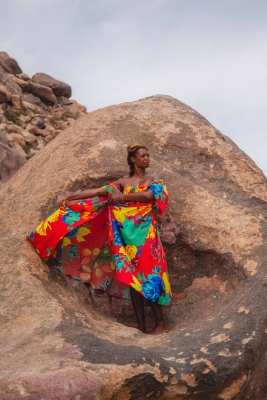
Which destination was your favorite and why?
Venice, Italy. It was the first place I lived outside the U.S. and where I started to understand the widespread impact of Pan-African culture. I remember going on a tour of St. Mark’s church in which I pointed to a large painting of men from Africa, Asia, and the Middle East that the tour guide referred to as “Jesus and the three wise men,” but there was no baby. Later, I visited the same church with my Syrian-Italian boyfriend he explained to me the mural represented Venice’s thankfulness for the wisdom Black and Brown culture brought to their advancement. They wouldn’t have had the mathematics to make cathedrals without us, nor the sand to fill their palaces with chandeliers. The Medicis, one of Europe’s first political dynasties, even had a Black prince. Venice made me curious. And helped me understand we are everywhere and the cornerstone that has built this world, which is how I came to write this book.
You were introduced as a “queer poet & journalist” but make mention of an ex- husband in the Netherlands. When did this new or hidden journey start?
I like that you refer to it as a ‘hidden journey.’ Like some Legends of the Hidden Temple quest where one day I stuck my hand up the booty of a Gold Monkey and came out gay. I use “queer” because it’s common among the upcoming generation. But I don’t like the word; I don’t believe in attaching strangeness or secrecy to the joy of human connection. So, have I always found Black women attractive? Yes. (Honestly, who doesn’t?) Did it take me thirty years to ask one of us out? Yes, because it’s scary. The freedom to be open in this world has always been dangerous. I write about the adventures romance can take us on at any age, because learning to experience pleasure on your terms, with liberation and consent, is an act of bravery.
How do you define love?
Revolution.
You mention the “dangers of beauty” while visiting Egypt. What does that mean?
I write about the dangers of being feminine in Egypt. Beauty is seduction and seduction is a feminine power. Growing up in the U.S., we may not wear hijabs but the rules are the same. How you flaunt your femininity defines who you are. Whether you are “good” or “bad” company, whether you are “too slutty” or “too soft.” Beauty isn’t dangerous, but fear of us harnessing the strength of feminine potential often leads to peril. In How to Live Free, I write about how, in Egypt, keeping my hair uncovered on vacation was risky business. It almost got my friend sold off to a stranger. But, across the border in Canada, people can’t understand why Americans are letting the government force us into giving birth. The fear of “beauty” as power is a worldwide threat to our civil rights.
Who did you see yourself being as a child and are they who you are now?
As a child, I wanted to become Prince or Grace Jones. I have yet to release an album but, after this interview, who knows.
When and where can we find this memoir?
Multitask. Buy this memoir where you buy your toiletries, at Target or Amazon. But if you really wanna be cute, pick it up while flirting at your local independent bookstore.
Photo Credits: Courtesy of Shayla Lawson


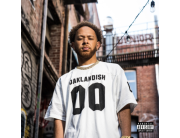
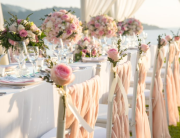
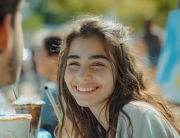
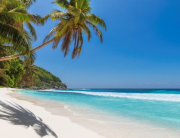
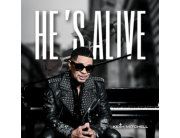
Add Comment
You must be logged in to post a comment.